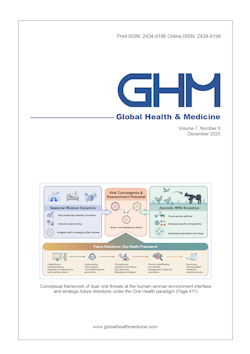Global Health & Medicine 2022;4(2):94-100.
For safe and adequate blood purification therapy in severe COVID-19 ‒ what we have learned so far
Katagiri D
Acute kidney injury (AKI) is defined as an increase in serum creatinine within 48 h or 1 week, or a decrease in urine output within 6-24 h. Continuous renal replacement therapy (CRRT) plays an important role in patients with severe AKI. In addition to direct cytotoxicity caused by the severe acute respiratory syndrome coronavirus 2, patients with coronavirus disease (COVID-19) experience endothelial cell damage, increased thrombogenic inflammation, and impaired immune responses. It has been reported that the more severe the case, the greater overproduction of cytokines and the more advanced the multiorgan failure. The kidney is widely recognized as one of the primary target organs; and COVID-19 positive AKI has been reported to have a greater rate of subsequent decline in renal function than COVID-19 negative AKI. Blood purification therapy has been used to prevent or alleviate organ damage in patients with moderate-to-severe COVID-19. Cytokine regulation is one of the primary therapeutic goals for these patients. Even with the widespread use of vaccines and antibody therapy, a certain percentage of patients develop moderate-to-severe diseases.
DOI: 10.35772/ghm.2022.01004







